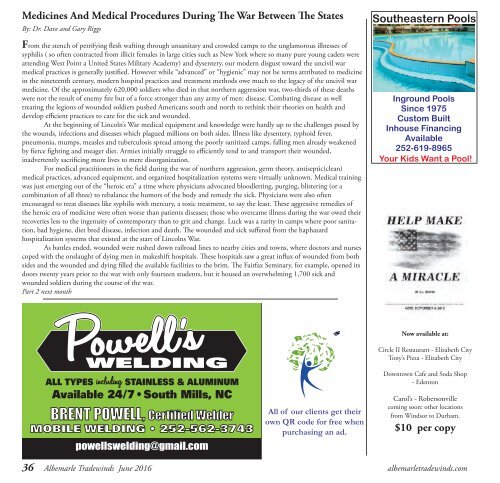Albemarle Tradewinds June 2016 Final Web Optimized
June 2016
June 2016
Create successful ePaper yourself
Turn your PDF publications into a flip-book with our unique Google optimized e-Paper software.
Medicines And Medical Procedures During The War Between The States<br />
By: Dr. Dave and Gary Riggs<br />
From the stench of petrifying flesh wafting through unsanitary and crowded camps to the unglamorous illnesses of<br />
syphilis ( so often contracted from illicit females in large cities such as New York where so many pure young cadets were<br />
attending West Point a United States Military Academy) and dysentery, our modern disgust toward the uncivil war<br />
medical practices is generally justified. However while “advanced” or “hygienic” may not be terms attributed to medicine<br />
in the nineteenth century, modern hospital practices and treatment methods owe much to the legacy of the uncivil war<br />
medicine. Of the approximately 620,000 soldiers who died in that northern aggression war, two-thirds of these deaths<br />
were not the result of enemy fire but of a force stronger than any army of men: disease. Combating disease as well<br />
treating the legions of wounded soldiers pushed Americans south and north to rethink their theories on health and<br />
develop efficient practices to care for the sick and wounded.<br />
At the beginning of Lincoln’s War medical equipment and knowledge were hardly up to the challenges posed by<br />
the wounds, infections and diseases which plagued millions on both sides. Illness like dysentery, typhoid fever,<br />
pneumonia, mumps, measles and tuberculosis spread among the poorly sanitized camps, falling men already weakened<br />
by fierce fighting and meager diet. Armies initially struggle to efficiently tend to and transport their wounded,<br />
inadvertently sacrificing more lives to mere disorganization.<br />
For medical practitioners in the field during the war of northern aggression, germ theory, antiseptic(clean)<br />
medical practices, advanced equipment, and organized hospitalization systems were virtually unknown. Medical training<br />
was just emerging out of the “heroic era” a time where physicians advocated bloodletting, purging, blistering (or a<br />
combination of all three) to rebalance the humors of the body and remedy the sick. Physicians were also often<br />
encouraged to treat diseases like syphilis with mercury, a toxic treatment, to say the least. These aggressive remedies of<br />
the heroic era of medicine were often worse than patients diseases; those who overcame illness during the war owed their<br />
recoveries less to the ingenuity of contemporary than to grit and change. Luck was a rarity in camps where poor sanitation,<br />
bad hygiene, diet bred disease, infection and death. The wounded and sick suffered from the haphazard<br />
hospitalization systems that existed at the start of Lincolns War.<br />
As battles ended, wounded were rushed down railroad lines to nearby cities and towns, where doctors and nurses<br />
coped with the onslaught of dying men in makeshift hospitals. These hospitals saw a great influx of wounded from both<br />
sides and the wounded and dying filled the available facilities to the brim. The Fairfax Seminary, for example, opened its<br />
doors twenty years prior to the war with only fourteen students, but it housed an overwhelming 1,700 sick and<br />
wounded soldiers during the course of the war.<br />
Part 2 next month<br />
<br />
<br />
<br />
<br />
<br />
<br />
<br />
<br />
Now available at:<br />
Circle II Restaurant - Elizabeth City<br />
Tony’s Pizza - Elizabeth City<br />
Downtown Cafe and Soda Shop<br />
- Edenton<br />
All of our clients get their<br />
own QR code for free when<br />
purchasing an ad.<br />
Carol’s - Robersonville<br />
coming soon: other locations<br />
from Windsor to Durham.<br />
$10 per copy<br />
36 <strong>Albemarle</strong> <strong>Tradewinds</strong> <strong>June</strong> <strong>2016</strong> albemarletradewinds.com

















